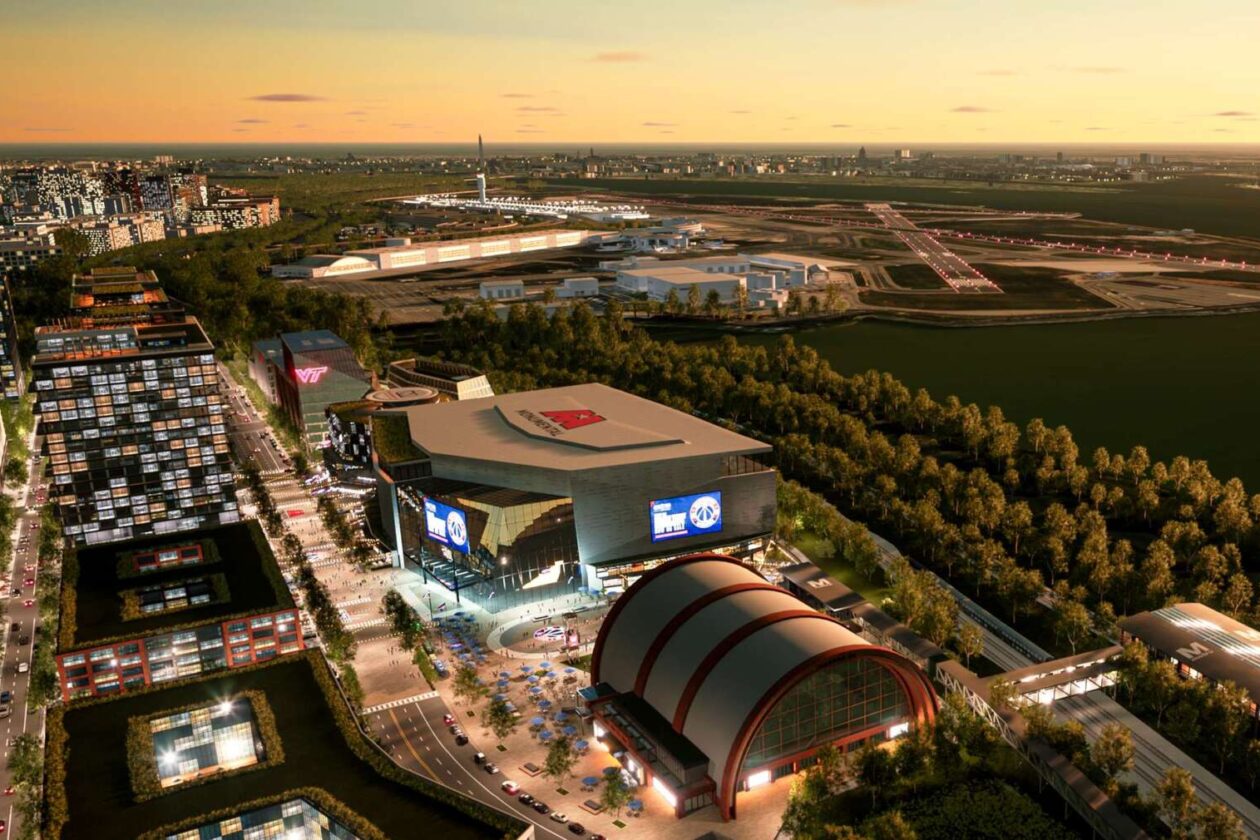
The deal to bring the Washington Capitals and Wizards to Alexandria’s Potomac Yard is officially dead, and the developer says suggestions that an arena could be built in Tysons instead were the final nail in the coffin.
Alexandria City officials revealed yesterday (Wednesday) that they had ended negotiations with developer JBG Smith, Wizards and Capitals owner Monumental Sports & Entertainment, and other stakeholders for a stadium in the proposed Potomac Yard Entertainment District. About an hour later, Monumental owner Ted Leonsis and D.C. Mayor Muriel Bowser announced that the two professional sports teams will stay at Capital One Arena in Chinatown after all.
After joining Leonsis and city leaders in December to tout the Wizards and Capitals’ planned move across the Potomac River, Virginia Gov. Glenn Youngkin lamented that “personal and political agendas” at the state level torpedoed a significant economic opportunity, while the city expressed disappointment in how discussions between Youngkin and the General Assembly unfolded.
However, JBG Smith CEO Matt Kelly pointed to a different culprit, claiming that “special interests” seeking to combine a sports arena with a casino in Tysons had “complicated and ultimately blocked” the Potomac Yard negotiations.
Despite our best efforts, this project was unable to get a fair hearing on its merits with the Virginia Senate. It is now clear that our efforts may have been complicated and ultimately blocked, in part, by special interests seeking to move the Monumental arena to Tysons Corner and to combine it with a casino. The Washington Post and other outlets have reported on this scheme and the hundreds of thousands of dollars, enormous sums in Virginia politics, of political contributions associated with it — a large portion of which were directed to key senate leaders. When one follows the money, the implications are deeply troubling for Virginia and for the future of transparency in economic development pursuits, especially those that seek certainty through the now damaged MEI legislative process.
The Washington Post reported on Sunday (March 24) that Senate Majority Leader Scott Surovell (D-34), hopeful Fairfax County casino developer Comstock CEO Christopher Clemente and political consultant Ben Tribbett, who counts both Surovell and Comstock as clients, had raised the idea of moving the Wizards and Capitals to Tysons instead of Alexandria with Monumental executives.
According to the Post, Leonsis and the other Monumental executives quickly rejected the proposal, which also didn’t appeal to Youngkin.
State Sen. Dave Marsden (D-37), who patroned the ultimately postponed bill to make Fairfax County — specifically a site in Tysons along Metro’s Silver Line — eligible for a casino, says he was never involved in “any serious talk” about combining the casino with a Monumental arena. The idea was “casually talked about” during the General Assembly’s session, which ended on March 9, but he never viewed it as a legitimate possibility.
“I think that was a last-minute thing people threw out there,” he told FFXnow. Read More

State lawmakers punted consideration of a casino in Fairfax County to next year, but that hasn’t stopped some proponents from seeking to assist in the divisive plan to bring the Washington Wizards and Capitals to Northern Virginia, whose odds of a comeback win are looking slim.
Senate Majority Leader Scott Surovell, who represents Fairfax County’s Richmond Highway corridor, recently pitched the idea of bringing both a casino and the sports arena to Tysons to a representative of Monumental Sports & Entertainment, which owns the basketball and hockey teams, the Washington Post reported on Sunday (March 24).
According to the Post, Surovell dropped the idea after Monumental President of External Affairs Monica Dixon “immediately” rejected it, but Christopher Clemente, CEO of the aspiring casino developer Comstock, and Ben Tribbett, a prominent consultant whose clients include Comstock and Surovell, “continued shopping the idea last week.”
The suggestion of combined arena/casino site in Tysons emerged as Monumental’s much-hyped plan to move the teams from D.C. to Alexandria’s Potomac Yard flailed for support. The Virginia General Assembly adjourned on March 9 without including funding for a state authority to finance the $2 billion entertainment district in their budget proposal, and at least one Alexandria City elected official withdrew her endorsement of the project.
Clemente told the Post that a joint development could “enhance financing options for the arena” by using tax revenue generated by the casino to guarantee bonds that would pay for the stadium, but Potomac Yard developer JBG Smith’s CEO, Matt Kelly, noted the deal could be used to evade Virginia’s requirement that casinos get approved by voter referendum.
Like the arena, Fairfax County’s potential casino is envisioned as part of an entertainment district, according to State Sen. Dave Marsden, who sponsored legislation to make the county eligible for a gambling establishment this past session and in 2023.
After vocal opposition from local residents and some officials, though the county board stopped short of taking an official position, a Senate committee voted on Feb. 6 to continue this year’s bill to 2025 to allow for more study and public engagement.
The combined facility proposal appears to be dead on arrival, with Monumental owner Ted Leonsis and Virginia Gov. Glenn Youngkin reportedly expressing “disgust” and “no interest,” respectively. But hypothetically, would you support the Wizards and Capitals calling Fairfax County home? Would it alter your stance on a casino?
Rendering courtesy JBG Smith

Hopes that Gov. Glenn Youngkin might sign a bill legalizing retail sales of marijuana in Virginia faded fast this week as Democrats blocked one of the governor’s top priorities: the plan to bring a professional sports arena to Northern Virginia.
As recently as Wednesday, according to multiple Capitol sources, the cannabis bill was being raised in closed-door budget talks with the governor as one of several Democratic priorities that could conceivably have been part of a package deal with the arena.
But the prospects of a grand policy bargain appeared to collapse Thursday as Democrats revealed a budget proposal without Youngkin’s arena plan, prompting the governor to say he was less inclined to look favorably on Democratic priorities. In a news conference (link added by FFXnow) on the Capitol steps, Youngkin said the arena deal Senate Democrats rejected involved up to 30,000 jobs and $12 billion in economic impact.
“And, bluntly, you want to talk about putting a cannabis shop on every corner?” Youngkin said. “I don’t quite get it.”
The governor said several other topics had been part of an “overall discussion” with Democrats. However, he suggested the rejection of an economic development project that could’ve drawn bipartisan support isn’t going to make him more likely to approve bills that passed mostly along party lines.
“I think this really sets us meaningfully back,” Youngkin said.
Del. Paul Krizek, D-Alexandria, a key sponsor of the marijuana proposal, said hopes for the bill were not high.
“As those great philosophers Tommy Chong and Cheech Marin would say, ‘It’s up in smoke,’” Krizek said.
Senate Majority Leader Scott Surovell, D-Fairfax, pointed to Youngkin’s comments on cannabis as evidence that it’s the governor who’s refusing to budge on issues that have popular support.
“He just basically flat out said one of our biggest priorities he’s not willing to consider,” Surovell said. “This governor wants to set the terms of every single negotiation as if he’s the sole arbiter of what’s reasonable in a bipartisan environment. That’s just not how it works. … If he wants something, he’s got to give us something.”
Youngkin can’t veto the marijuana bill immediately, because it technically hasn’t been sent to him yet. After this week’s developments, it may only be a matter of time. Youngkin said again Thursday that he doesn’t have “any interest” in greenlighting a retail marijuana market during his four-year term.
He has just under two years remaining, and if Democrats retake the Executive Mansion in 2025, the bill sent to Youngkin this year could potentially be the starting point for future legislative efforts. Read More

In an attempt to stem what Democratic lawmakers say is an epidemic of guns being stolen from vehicles, the Virginia Senate passed legislation Thursday that would create a $500 civil penalty for firearm owners who leave handguns on a car seat or other areas visible to passersby.
The legislation, one of the first gun control measures put to a full vote in either chamber this year, still needs to pass the House of Delegates and is likely at risk of being vetoed by Gov. Glenn Youngkin after the session ends. Still, the issue highlights the two parties’ diverging views on how to address gun crime, with Democrats trying to reduce the number of guns flowing onto the streets and Republicans calling for tougher enforcement of existing laws.
Sen. Dave Marsden, D-Fairfax, said the bill he’s sponsoring uses a “light touch” to try to limit the supply of guns available to people who shouldn’t have them.
“We cannot have our vehicles here in the commonwealth act as vending machines for firearms,” Marsden said.
If authorities spot a vehicle with a visible handgun inside, the bill would allow them to have the vehicle towed. The law would apply to any “unattended motor vehicle” left on a public highway or public property where neither the driver nor a passenger can see it.
To illustrate the extent of the problem they’re attempting to solve, Democratic lawmakers pointed to recent statistics presented by the Richmond Police Department showing a major uptick in the number of guns stolen from vehicles in Virginia’s capital. There were 225 such thefts in 2017, according to city police, and 637 in 2022.
All 19 Republicans in the Senate voted against the bill, with the chamber’s 21 Democrats voting to pass it.
Sen. Mark Peake, R-Lynchburg, said the fundamental problem is people breaking into cars to begin with, adding that thieves could steal money or anything else of value left in a car and use the proceeds to buy a gun.
“We have to stop it at the beginning,” Peake said. “And that is by stopping people who are breaking into cars.”
Sen. Mark Obenshain, R-Rockingham, argued the bill would have no impact because he’s doubtful many gun owners are so careless as to leave a handgun in plain sight for would-be thieves. The state should instead focus on different kinds of incentives for safe storage, Obenshain said, such as a bill passed in 2023 that created a $300 tax credit to help Virginians buy gun safes and lockboxes.
“We ought not be punishing victims of crimes,” Obenshain said.
Democratic senators said the law’s passage alone would send a message to Virginia gun owners to be more thoughtful about how they store firearms in vehicles.
“Responsible gun owners ought to get in the habit of putting their gun in the glovebox,” said Senate Majority Leader Scott Surovell, D-Fairfax. “Put it in the glovebox every time they get out of their car. Just make it a habit.”
Photo via Tom Def on Unsplash. This article was reported and written by the Virginia Mercury, and has been reprinted under a Creative Commons license.
Inova Mount Vernon Hospital will open a new behavioral health unit next week, marking an expansion of mental health care along the Richmond Highway corridor.
A ribbon-cutting ceremony was held yesterday morning (Tuesday) for the nearly $10 million facility, which will increase bed capacity at the hospital by 67%.
Close to $4 million was donated by Amyia and Jeff Veatch, a local entrepreneur who founded the engineering firm Apex Systems. The family previously donated money to help modernize the hospital’s emergency room.
Hospital leaders and a number of elected officials attended the ceremony, including Rep. Don Beyer, State Sen. Scott Surovell, Del. Paul Krizek, Mount Vernon District School Board Rep. Karen Corbett Sanders, and Mount Vernon District Supervisor Dan Storck (who had to leave to vote on the county budget).
The Inova Veatch Family Behavioral Health Unit will open to hospital patients on May 16. It will feature 20 additional beds, private rooms, “quiet” spaces, modernized equipment, and enhanced safety features, like impact resistance windows and drywall.
Along with the hospital’s existing adult psychiatric unit, the total capacity for behavioral health patients will now be 50 beds.
As many noted during the ceremony, mental health care and behavioral services have become a priority in Fairfax County, as rates of depression and suicidal thoughts, specifically among young people, have risen drastically in recent years.
“We have a significant shortage of mental health services all over Virginia and especially acute here in Northern Virginia,” Surovell, who represents Hybla Valley, Woodlawn, and parts of Franconia, told FFXnow. “That’s the big reason we need to expand these services. If you don’t have a place for people to go when they need help, it can result in really tragic consequences.”
He called private contributions like the one made by the Veatch family “critical” to expanding care, particularly since behavioral services “are often not the most profitable areas for a hospital to invest in.”
But he said it’s also on the state to make the necessary investments as the need for mental health care continues to skyrocket.
Virginia Gov. Glenn Youngkin has proposed $230 million in this year’s budget for addressing gaps in behavioral health services. Surovell said that doesn’t go far enough.
“This is about half of what we need because the state is so far behind in investing in behavioral health,” he said.
Mount District Supervisor Dan Storck agreed, stating at the ribbon-cutting that “we’ve never done enough” to provide mental health care both locally and across the country. Adolescent care in particular is lacking, he told FFXnow.
“We need more adolescent psychiatry units. Our adolescents are bearing the brunt of Covid,” Storck said. “They need more support than we can provide. Inova is stepping up in their Fairfax hospital, but that’s still inadequate to our adolescent needs.”
Beyer shared that his son suffers from schizophrenia and has been hospitalized “many times” at Inova Mount Vernon Hospital. The additional unit will hopefully provide care to more people in need like his son, he said.
While more resources are needed, the Veatch behavioral health unit and emergency room are potentially life savers for residents of the Richmond Highway corridor, Surovell said.
“They don’t have to travel to either Alexandria [City] or Franconia or Fairfax to get these services,” he said. “Having a facility that’s close can be the difference between life or death for a lot of people.”

(Updated at 11:30 p.m.) Redistricting is going to make a number of state senate races in Fairfax County very interesting this year.
Just like the House of Delegates, every Virginia State Senate seat is up for election in 2023, and like in the Virginia General Assembly’s other chamber, several primaries may be extremely competitive after the 2021 redistricting process shook up electoral boundaries.
Incumbents that could face off
In the newly-drawn District 35, which covers Annandale, Springfield, and George Mason University, two longtime incumbents could be facing off.
Sen. Dave Marsden had been the senator in District 37 since 2010, but redistricting pushed him and about 31% of his constituents into the new district. He announced his bid for reelection a year ago and has been campaigning ever since, a campaign spokesperson told FFXnow.
“He’s knocked doors in more than half of the precincts of the new SD35, and looks forward to continuing to serve the residents of Fairfax,” the spokesperson said.
Marsden’s potential primary opponent, Sen. Dick Saslaw, has been in the senate since 1980, making him its longest-serving current member. He’s also been the Senate majority leader since the Democrats took control in 2020. While redistricting kept Saslaw in the 35th District, only about one-third of his former constituents remain with him.
There have been persistent rumors that the 82-year-old might retire, but no announcement has been made yet. FFXnow reached out to Saslaw about his 2023 intentions but hasn’t heard back as of publication.
Marsden and Saslaw, if he seeks reelection, would also face newcomer and entrepreneur Heidi Drauschak, who declared her candidacy for the Democratic nomination earlier this month.
The newly-drawn District 38, which includes Herndon, Reston, and McLean, could also pair two Democratic incumbents, including one that also has been rumored to retire.
Sen. Jennifer Boysko first became a senator in 2019 after previously serving in the House of Delegates for two terms. She hasn’t officially announced anything about 2023 and didn’t respond to FFXnow’s request for comment, but said last year that she intends to run again.
However, she may have to run against Sen. Janet Howell in the Democratic primary.
Howell has served in the senate for more than two decades, representing District 32. Her former constituents make up nearly half of the new District 38, but there are also similar rumors about her retiring.
Howell didn’t respond to inquiries from FFXnow.
Boysko told FFXnow when the redistricting maps were announced last January that she holds an enormous amount of respect for Howell, calling her “the dean of the Senate” and a “true pioneer for women in government.”
Whoever wins the Democratic nomination will have to face Republican Matt Lang in the Nov. 7 general election. Lang challenged Del. Ken Plum in 2021 but lost rather handily.
He told FFXnow that he’s running to break the “blue wall” in the senate, focusing on education policy, public safety, transportation issues and financial mismanagement.
Other potential primary battles
Other primaries that are shaping up to be potentially competitive include District 36, which covers Centreville, Chantilly, Clifton, and Fair Oaks.
Stella Pekarsky, who represents the Sully District on Fairfax County’s school board, announced last week that she will challenge for the seat to “stand up” to Governor Glenn Youngkin.
The incumbent is four-term George Barker, though redistricting kept only about 6% of his former constituents in District 36. As a member of the Virginia Redistricting Commission, he came under some fire in 2021 for drawing himself back into a district that, at the time, had no other challengers. Read More

(Updated at 5:20 p.m.) A new bill that would let Virginia law enforcement use facial recognition technology is headed to the governor’s desk.
Senate Bill 741, which was proposed by Sen. Scott Surovell (D-36), would let local law enforcement agencies use the technology to investigate specific criminal incidents related to certain acts of violence and to identify deceased individuals and victims of online child sexual abuse material.
“The bill would put regulations and restrictions in place along with regular transparency for the use of facial recognition — not just with law enforcement, but also with identifying persons,” Surovell said.
Passed by the Virginia General Assembly earlier this month, the bill was communicated to Gov. Glenn Youngkin last Tuesday (March 22). If signed, the bill would create a model for local law enforcement agencies, which could create their own policies but must meet standards set by the Virginia State Police.
For now at least, the legislative shift doesn’t seem to have inspired any particular interest from Fairfax County’s law enforcement agencies.
“Fairfax County Sheriff’s Office does not possess facial recognition technology and has no plans to acquire or implement such technology,” Fairfax County Sheriff’s Office spokesperson Andrea Ceisler told FFXnow.
County Director of Public Affairs Tony Castrilli said that the Fairfax County Police Department also does not currently use facial recognition technology.
“The legislative process regarding this bill is pending,” he said. “As a result we will not be providing any response at this time.”
Virginia currently has a partial ban on local law enforcement agencies using facial recognition technology. That measure took effect in July 2021.
The partial ban does not extend to the Virginia State Police, and local law enforcement agencies can apply to the state police to use the technology in their cases.
“The only system that has been and is currently in use is the Centralized Criminal Image System, which was procured through DataWorks Plus,” VSP Public Relations Director Corinne Geller said. “CCIS allows criminal justice users to access images for identification purposes as well as perform lineups, witness sessions and facial recognition searches.”
The system lets the VSP compare an unknown image to a database of mugshots of previous arrestees. The software returns a list of candidates, rather than making a one-to-one match. CCIS is contained within the VSP’s Criminal Justice Information Services Division.
Surovell says he developed S.B. 741 to replace the partial ban, arguing that facial recognition technology could help police solve cases more quickly. He specifically cited last year’s so-called “shopping cart killer” investigations as an example when talking to FFXnow.
Other lawmakers fear the bill may contribute to civil rights issues and over-policing.
“When we consider the use of facial recognition technology by law enforcement, the stakes are high because a mistake could mean that you deny justice for a victim and you take away an innocent person’s freedom,” Del. Kathy Tran (D-42) said. “The research is clear — women and people of color, particularly Black and Asian people, have greatly elevated risks of being falsely identified by this technology.”
Youngkin has until 11:59 p.m. on April 11 to sign SB 741 into law. If he does, the Virginia State Police would be required to develop a policy for the technology’s use by Jan. 1, 2023.
Photo via FCPD/Facebook

